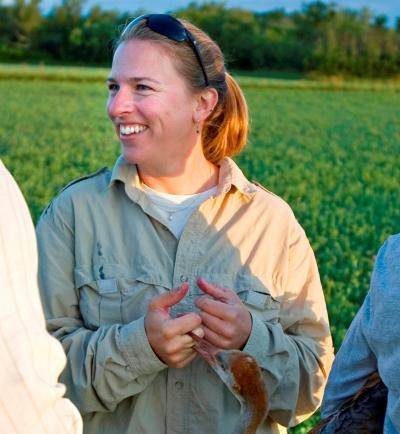Sunday Speaker Series
Oct. 10: Saving the Cranes of North America
Less than a century ago, the great naturalist Aldo Leopold noticed declining numbers of sandhill cranes in the wild. He predicted that the species would die off in his lifetime. Instead, we are happy to report, cranes have rebounded spectacularly. In fact, the upper Midwest today is host to both the most species and the rarest species of crane in the world.
 Here in northeastern Illinois, it isn’t unusual to see pairs of sandhill cranes passing the time in suburban grasslands. People have occasionally noticed hundreds of cranes in the sky during migration. The birds are large, and their flocks can be immense.
Here in northeastern Illinois, it isn’t unusual to see pairs of sandhill cranes passing the time in suburban grasslands. People have occasionally noticed hundreds of cranes in the sky during migration. The birds are large, and their flocks can be immense.
Saving the crane was no accident, though. It has taken decades of work.
Anne Lacy, senior manager of North American programs for the International Crane Foundation (ICF), will join us on Sunday, Oct. 10, at 7 p.m. to share her expertise and wisdom on saving both the sandhill and the whooping crane, along with 13 other species of crane. She also will talk about the behaviors and natural history of cranes here and around the world.
“Through the charisma of cranes, we envision a future where people work together to protect and restore wild crane populations and the landscapes they depend on—and by doing so, find new pathways to sustain our water, land, and livelihoods,” Lacy said.
A native of Madison, Anne has a graduate degree in biology and undergraduate degrees in psychology and biology. She has worked for the ICF for 20 years.
Based in Baraboo, Wisconsin, the ICF works to conserve cranes and the ecosystems, watersheds, and flyways on which they depend. Its mission is to provide knowledge, leadership, and inspiration to engage people in resolving threats to cranes and their diverse landscapes.
The ICF is perhaps best known for the pioneering work of one its founders, George Archibald. He worked for three years with an endangered female whooping crane to induce it to reproduce. He went so far as to dress up as a male crane.
ICF's work spans the globe. The ICF maintains a regional base in China and shares program offices with partner organizations in Cambodia, India, South Africa, Vietnam, and Zambia. It is committed to a future where all 15 of the world’s crane species are secure.
Register now to join us for Anne's presentation on Oct. 10.
Anne’s presentation is another in a series of online programs sponsored by the Woods & Wetlands Group. The program is free and open to the public. Registration is required to get the login link.
The Woods & Wetlands Group holds public meetings on the second Sunday of each month.
Be sure to mark your calendar for Nov. 14, when author John Hildebrand will share what he learned by paddling a canoe on many of Wisconsin’s wild rivers. Cobbling together rivers from the burly Mississippi to the slender wilds of Tyler Forks, Hildebrand navigated the beautiful but complicated territory of home. In once-prosperous small towns, he discovered unsung heroes—lockmasters, river rats, hotelkeepers, mechanics, environmentalists, tribal leaders, and perennial mayors—struggling to keep their communities afloat.